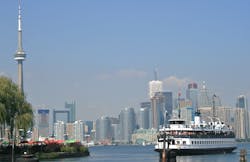Toronto City Parks staff pushing for fleet shift to Electric Vehicles & Vessels
The City of Toronto staff in Parks, Forestry and Recreation (PFR) has submitted a report, recommending a plan to replace Toronto’s aging fleet of ferry vessels with fully electric vessels.
The report recommends replacing the four primary ferry vessels, which transport over 1.4 million passengers and 5,000 vehicles annually to the Toronto Island Park. The transition to electric vessels will take place over a 15-year period. The proposed strategy was to switch to hybrid diesel-electric technology.
The report recommends greater funding for the additional design and construction of support services for the electric fleet, including shore-side infrastructure.
Full electrification of the vessel fleet will lead to a reduction of 2,800 tonnes of greenhouse gas (GHG) emissions annually. With displaced diesel fumes, the transition will ensure a better ridership experience for visitors by reducing air and noise pollution. Moreover, full fleet electrification will result in annual savings of up to C$1.1 million.
Estimates for the completed designs of the project show that C$23 million to C$25 million will be needed per vessel. These estimates are for hybrid vessels, which will have increased passenger capacity. Additional costs will be needed for shore-side infrastructure.
Related Stories
Siemens Energy delivering diesel-electric propulsion for NOAA vessels
Electric ferries to ply waters of Lake Ontario
The shift to full electrification supports the City’s TransformTO Net Zero Strategy, aimed at achieving net zero city-wide greenhouse gas emissions by 2040. The report will be considered by the General Government and Licensing Committee (GGLC) on January 14.
“Full electrification of Toronto’s ferry fleet is an innovative way to help our city achieve its net-zero goals, while improving the experience of riders,” said Councillor Jennifer McKelvie (Scarborough-Rouge Park), Chair of the Infrastructure and Environment Committee.
The investment payback on complete fleet replacement to EVs would be $1.1 million just in fuel cost savings annually, city officials say.





